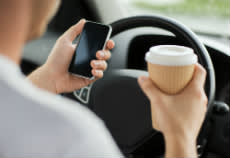The Role of Distracted Driving in Personal Injury Cases
Oct. 27, 2014
 Distracted driving has emerged as a disturbing trend that poses a serious threat not only to preoccupied drivers, but to other motorists on the roadways. Accidents caused by this unsafe practice have seen a major uptick in recent years due to the widespread use of smart phones to text and post to social media platforms, such as Instagram and Twitter, while driving. Although drivers of all ages may be guilty of driving while distracted, studies have found that teenage drivers are especially tempted to use their phone to snap photos or text from the driver's seat.
Distracted driving has emerged as a disturbing trend that poses a serious threat not only to preoccupied drivers, but to other motorists on the roadways. Accidents caused by this unsafe practice have seen a major uptick in recent years due to the widespread use of smart phones to text and post to social media platforms, such as Instagram and Twitter, while driving. Although drivers of all ages may be guilty of driving while distracted, studies have found that teenage drivers are especially tempted to use their phone to snap photos or text from the driver's seat.
Personal injury lawsuits on the basis of distracted driving are becoming more prevalent. A wrongful-death suit against taxi-alternative company Uber cites distracted driving as the cause of a collision that killed a 6-year-old girl and injured her mother and brother while they were crossing the street on New Year's Eve in California. Allegedly, the Uber driver was logged into the company's smart phone app, waiting to receive and accept a ride request, when his SUV collided with the girl and her family. Although this case doesn't involve a teenage driver, it demonstrates how (alleged) smart phone use while driving can have horrifying consequences.
More than 3,300 fatalities occur each year as a result of distracted driving, according to the Department of Transportation and Distraction.gov, the official US website dedicated to distracted driving. Drivers are twice as likely to crash if they're texting while driving than if they were paying attention.
Car crashes are the leading cause of death among teenagers, with cell phone use being reported in 18 percent of all distraction-related fatalities in America. These scary statistics have led the National Highway Traffic Safety Administration (NHTSA) to create an campaign against distracted driving aimed at young adults.
If you have teenaged children or you just happen to be up on current trends, you'll know that many young people use their cell phones to take "selfies", a nickname for self-portraits. It's come to the attention of law enforcement and safety advocates that teens are taking selfies and posting to social media while behind the wheel, some of them even use the hashtag #Ihopeidontcrash with their photos. Expressing that fear, even though it's disguised with a supposedly amusing hashtag, shows that these young drivers have an inkling as to how dangerous this practice could be.
On average, texting takes your eyes off the road for 4.6 seconds. Distraction.gov says that at 55 mph, 4.6 seconds with your eyes on your cell phone is like driving an entire football field blindfolded.
Distracted driving falls into three main categories:
manual: taking your hands off of the wheel
visual: taking your eyes on the road
or cognitive: not being mentally present while driving.
Distracted driving laws vary by state, but many have a law in place that bans drivers from using handheld phones. In addition, most states ban bus drivers and beginner drivers from all cell phone use (handheld and hands-free), and enforce a ban on texting for all drivers.
